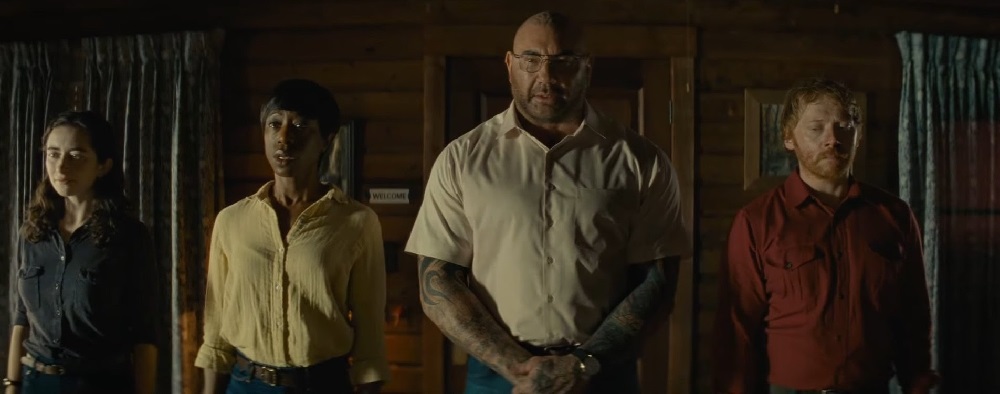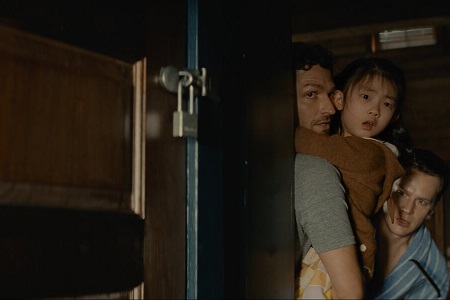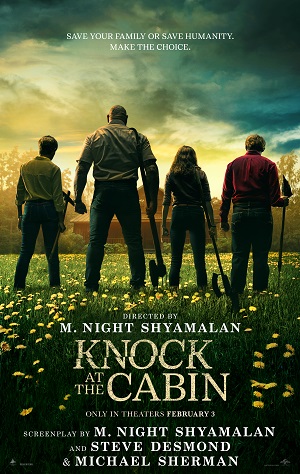
Shyamalan’s Knock at the Cabin: An Apocalyptic Conundrum
There is a lot to love about M. Night Shyamalan’s latest tale of terror and dread Knock at the Cabin. The performances by Dave Bautista, Ben Aldridge, Jonathan Groff, Abby Quinn, Nikki Amuka-Bird, Rupert Grint, and newcomer Kristen Cui are all excellent. Shyamalan’s screenplay, co-written with Steve Desmond and Michael Sherman and adapted from Paul Tremblay’s best-selling book The Cabin at the End of the World, is smart, concise, and at times bone-chilling. The film is meticulously shot with disquieting precision by Jarin Blaschke and Lowell A. Meyer.
And yet, I was still disappointed. Having not read Tremblay’s novel, I cannot say if my reservation has more to do with the source material or with Shyamalan’s reworking of it. I can state that I do not believe the film earns its climax.
I know what Shyamalan is trying to say. I get what he is doing. But I don’t think it works, and considering how refreshing it is to see a story like this — one that revolves around two blissfully married men and the adopted child they love with every ounce of their souls — such a sentiment darn near breaks my heart.
Eric (Groff) and Andrew (Aldridge) are on a relaxing weekend vacation with their daughter Wen (Cui). They have taken up residence in a secluded mountain cabin near a beautiful lake; everything could not be any more picturesque or perfect. It’s just what they all needed, and their collective happiness is beyond measure.
Things change with the arrival of Leonard (Bautista), Sabrina (Amuka-Bird), Ardiane (Quinn), and Redmond (Grint). They carry homemade weapons fashioned out of everyday items found in a garage or tool shed. But they claim they will not harm Eric, Andrew, and Wen. Instead, they tell the men that they have a horrible decision to make: one member of the family must willingly sacrifice themselves. If they do not, Armageddon will begin, and all life on earth will end save for their own, and the trio will be condemned to wander a barren wasteland alone until they too perish. As scenarios go, this one certainly punches the viewer in the gut right from the jump.
Shyamalan cuts to the chase almost immediately, revealing the central conundrum facing this family, without the typical convolutions or sleight of hand viewers have come to expect from the maker of The Sixth Sense, Unbreakable, and Old. The four strangers, led by Leonard, fully believe every syllable of what they’re stating. In turn, Eric and Andrew are equally inclined to treat them all as fanatical kooks who want to persecute them for being Gay. It’s pretty much that simple.
Or is it? I like how the screenplay deftly weaves in the backstory of Eric and Andrew’s relationship, including their adoption of Wen. These brief snapshots marvelously flesh the pair out, making the unimaginable pain of the situation they suddenly find themselves in all the more palpable. Shyamalan has learned over the decades that less is more, and it’s nice to see him focusing more on his characters and their emotional vacillations than trying to deceive the audience in an attempt to conceal the type of climactic “twist” he’s long been known for.
As great as this may be, and no matter how progressive it may seem to have Eric and Andrew as the protagonists, there are pieces that refuse to sit well with me. Shyamalan’s commentary on rightwing ideologues trampling over the civil rights of the LGBTQ community is commendably unsubtle, but where he eventually goes unintentionally feeds stereotypes and narratives that do not need any additional fodder.
Yes, the biblical implications are clear (think the story of Abraham in Genesis), but that does not make what transpires any easier to swallow. Things get taken to a place that borders on exploitive, and I almost wish Shyamalan would have gone full-on John Carpenter (or even The Cabin in the Woods) and went fully apocalyptic.
Instead, we get ruminations on sacrifice, family, forgiveness, and faith that are all messily handled. The Queer trauma that is the foundation of so much of the film is never explored with any clarity or nuance. There is a didactic finality to this presentation that becomes increasingly unbearable as events build to their conclusion. As admirable as Shyamalan’s attempt at acceptance and inclusion may be, that it comes across like tin-eared window dressing instantly negates the majority of the film’s commendable aspects.
The acting is terrific, and Bautista is particularly outstanding; this may just be the best performance of his career. The film is also magnificently shot and edited, while composer Herdís Stefánsdóttir’s strong score offers up its fair share of symphonically unexpected permutations.
But none of that was enough for me. The ending did not work, and the more distance I get from it, the more I can feel my anger grow. For every positive stride Shyamalan takes toward LGBTQ representation in Hollywood, there are almost as many going upsettingly backward, and I’m starting to think Knock at the Cabin was one cinematic rap on the door I should have left unanswered.
– Review reprinted courtesy of the SGN in Seattle
Film Rating: 2 (out of 4)








